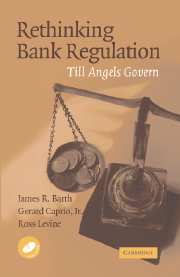Book contents
- Frontmatter
- Contents
- List of Figures, Tables, and Appendices
- Preface
- Rethinking Bank Regulation
- 1 Introduction
- 2 Contrasting Approaches to Bank Regulation
- 3 How Are Banks Regulated and Supervised Around the World?
- 4 What Works Best?
- 5 Choosing Bank Regulations
- 6 Rethinking Bank Regulation
- Appendices
- References
- Index
4 - What Works Best?
Published online by Cambridge University Press: 06 July 2010
- Frontmatter
- Contents
- List of Figures, Tables, and Appendices
- Preface
- Rethinking Bank Regulation
- 1 Introduction
- 2 Contrasting Approaches to Bank Regulation
- 3 How Are Banks Regulated and Supervised Around the World?
- 4 What Works Best?
- 5 Choosing Bank Regulations
- 6 Rethinking Bank Regulation
- Appendices
- References
- Index
Summary
The more extensive a man's knowledge of what has been done, the greater will be his power of knowing what to do.
DisraeliIt ain't what you don't know that gets you into trouble. It's what you know for sure that just ain't so.
Mark TwainGOALS AND BOUNDARIES
Goals
This chapter assesses the book's central question: which bank regulatory and supervisory strategies work best? As stressed in Chapter 1, three inter-related motivations drive this chapter's analyses. First, because banks importantly influence economic growth, poverty alleviation, and economic volatility (Levine, 2005a), it is critical to identify those policies that encourage efficient bank operations. Consequently, this chapter provides the first broad, cross-country assessment of a variety of regulations to determine which ones enhance bank development, stability, efficiency, performance, and the degree of corruption in bank lending. Second, the Basel Committee routinely makes influential recommendations for countries to adopt regarding bank regulatory and supervisory strategies. As described in Chapter 2, it most recently recommended Basel II, which is based on three pillars: capital standards, official supervision, and market discipline, respectively. This chapter provides the first cross-country assessment of the relative merits of these three “pillars.” Third, our inquiry about what works best in bank regulation and supervision bears directly on the epic debate on the proper role of government in an economy. From before the Federalist Papers, philosophers, political scientists, and economists have warned about the adverse repercussions of unchecked power of any branch of government.
- Type
- Chapter
- Information
- Rethinking Bank RegulationTill Angels Govern, pp. 178 - 257Publisher: Cambridge University PressPrint publication year: 2005



